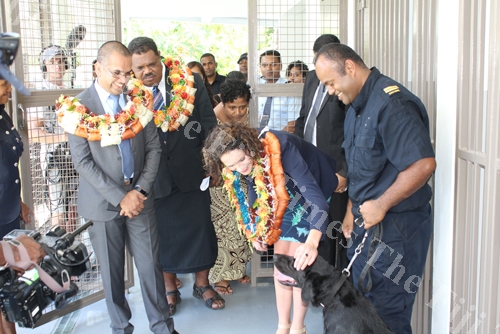TWO years ago, Fiji Revenue and Customs Service (Revenue and Customs Service) in collaboration with Fiji police, New Zealand Customs and New Zealand Police implemented a joint initiative to strengthen Fiji’s border security by officially opening the Fiji Detector Dog Unit at the Nadi International Airport. The aim of this initiative was to increase the capabilities in detection and seizures of prohibited goods including illicit drugs and currency. No doubt, the Fiji Detector Dog Unit in Nadi was a huge success after the unit was instrumental in intercepting hard drugs and detecting narcotics like cannabis, steroids, ephedrine (precursor) and liquid products used for producing explosives. This positive feedback prompted the stakeholders to boost the unit’s capability and as a result the Fiji Detector Dog Unit was commissioned in Suva last year. Fiji now has highly trained detector dogs at our borders.
The journey
With absolutely no experience in handling detector dogs, it was a tough decision for Customs and Fiji Police to implement this initiative. But of course, with the assistance of the New Zealand Police and New Zealand Customs, selected Customs and police officers were sent to New Zealand for training. The handlers were specially selected for their ability to work with and understand the behaviour of detector dogs. The labradors selected for the unit underwent training in the detection of specific types of items such as drugs, explosives and currencies before being commissioned into active duty.
Aim of the unit
While laying out the ground work and requirements for the establishment of the Fiji Detector Dog Unit, the intention was clear. The unit aimed to stop the flow of illicit drugs into the country and strengthen partnership between border agencies to protect our borders. With Fiji being the hub of the Pacific, stakeholders were adamant that the unit will be instrumental in preventing criminals using Fiji as a transit or destination point for illicit goods.
Enhancement
Since its inception in 2016, the Fiji Detector Dog Unit in Nadi has so far intercepted 13 cases of hard drugs and more than 35 seizures of drugs, cash and firearm. The detector dog unit capability was further strengthened when more Customs and police officers were sent to New Zealand for training before the unit in Suva was opened in 2017. The unit was commissioned by the New Zealand High Commission. The detector dogs can detect smuggling of illicit drugs concealed in passenger’s luggage, cargo, aircraft, vessels, postal consignments. The dogs for Fiji were sourced from the Australian Border Force’s renowned detector dog breeding program before being trained in New Zealand at the Police Dog Training Centre in Wellington.
Achievements of the unit
With the strong detection capability, so far, the Fiji Detector Dog Units in Suva and Nadi has been successful in intercepting 27kg hard drugs worth $25 million and contrabands including currency smuggling of $98,000. Both units have eight sniffer dogs with Customs and police as handlers.
Partnership
New Zealand Customs and New Zealand Police has played a significant role in providing guidance and support to Revenue & Customs and Fiji police in setting up detector dog unit operations in Fiji. The agencies continue to work together in ensuring the detector dog capability combats cross-border organised crime in the region and trade in illicit drugs and imports. Revenue and Customs and its partner agencies will continue to work together to ensure that our borders are safe.






